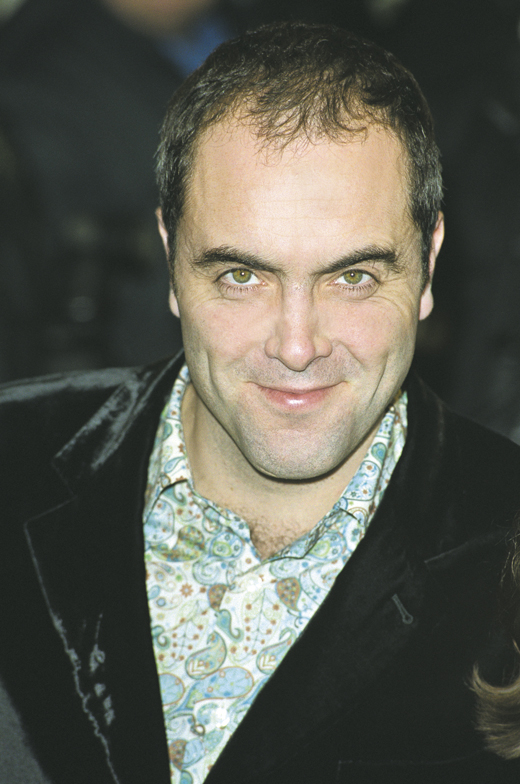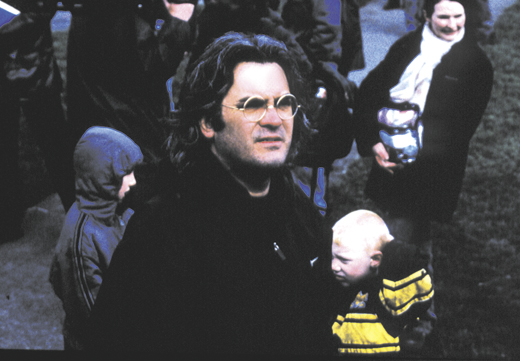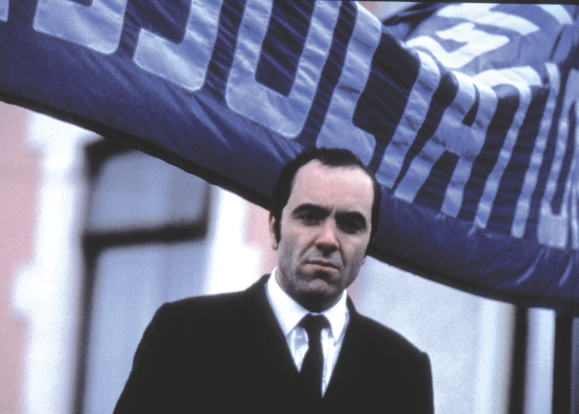The making of the movie Bloody Sunday was a tremendous undertaking for all involved. For actor James Nesbitt it was the beginning of an extraordinary journey that become much more than just about acting.
℘℘℘
James Nesbitt is an actor who has had great success in comedic roles such as Adam in the TV series Cold Feet and the pig farmer in Waking Ned Devine, but his latest movie is a departure for him in that it’s not in any way funny. The movie, Bloody Sunday, now on release in the U.S., is about an actual event that happened on Sunday, January 30, 1972, when a civil rights march in Derry, Northern Ireland, turned into a blood bath as the British Army opened fire on the crowd. Twenty-seven people were shot on that day — thirteen people died. A fourteenth person later died of injuries sustained.

Bloody Sunday has won numerous awards including Audience Award for World Cinema at Sundance Film Festival; Golden Bear Prize at Berlin International Film Festival; and Best Director, Best Actor (Nesbitt) at the British Independent Film Awards. It missed being considered for an Oscar nomination because of a rule disqualifying it due its having been shown on British TV prior to its cinematic release.
In the movie Nesbitt takes on the role of Ivan Cooper, a shirt-factory manager and local politician who was involved in the civil rights movement. His performance has received high praise from the critics. But Nesbitt, like Cooper, is a Protestant, and in accepting the role he also knew there was a chance that he would be seen in his own community in Northern Ireland as “going over to the other side.” Indeed, he has received death threats as well as praise for his performance. But once he read the script he knew he had to do the movie. There was some element of “Oh, Christ, I almost wish I hadn’t read this,” he admits, “because having read it I couldn’t walk away from it.
“I think Protestants have walked away from it for years,” he continues. “No one wanted to own Bloody Sunday. As Jim Sheridan [producer] said,”The Irish don’t forget and the British don’t want to remember it.'”
I met up with Nesbitt in the Oak Room of the Plaza Hotel for lunch two days after the New York premiere of Bloody Sunday last October. He has been doing the circuit of interviews, and he’s tired. He loves New York, but it is a party town, and much as he enjoys that (Nesbitt has a reputation for same), he is anxious to get home to his wife, Sandra, and two girls, Peggy, 5, and Mary, 7 months.
He met Sandra, an actress, when he did a world tour of Hamlet. “It was a bad production, but she was wonderful. It was one of those `when you walk into a room’ things — I looked at her and I said, `That’s the girl for me.'”
It will be a brief touch-down in London, however — just 24 hours and he’s off to Manchester to film another episode of Murphy’s Law, a television series about a Northern Irish man who ends up in Britain after something terrible happens to him back home. “But [the show] is funny, anyway,” Jimmy says.
“I should slow down,” he laughs, “but it’s that Protestant work ethic. I can’t turn down work.”
Nesbitt grew up the son of a school-teacher in rural Co. Antrim, near Ballymena, the only boy with three older sisters. His family is very proud of their Protestant culture, but he says that his father is “an egalitarian.” In fact, as a youngster Nesbitt was a boy soprano and his father used to take him to sing at Irish Feiseanna (festivals). He also took piano lessons in the local convent.
Despite this exposure to Irish “Catholic” culture — as a teenager he always dated Catholic girls (he “liked the danger” he says with a laugh) — there was “a great sense of denial about what was going on” in the province.
“The reality of life in Northern Ireland,” says Nesbitt, who was only six years old when Bloody Sunday happened, “is that if you were Protestant you learnt British history and if you were Catholic you learnt Irish history in school.” So, he says, in a way the movie was a rite of passage for him — a growing up.
“I come from a generation in Northern Ireland where we sort of didn’t almost want to acknowledge the troubles in our country. I was almost shamed by it when I read the script, and I couldn’t not do the movie.”
And so began what Nesbitt describes as an extraordinary journey, one that became much more than just about acting. “It was a personal odyssey,” he says. “I felt I was making a film about my country, a country that I love and was trying to make sense of. It made me for the first time see why all these terrible things have happened.”
It was an emotionally wrenching experience, he admits, but his respect for British director Paul Greengrass who got him involved with the movie is apparent. Greengrass was the first journalist to film inside the Maze Prison, while covering the hunger strikes in 1981. He had read Don Mullan’s Eyewitness Bloody Sunday and decided that he as a British person had an obligation to explore this side of modern British/Irish history.

But though Nesbitt too felt the obligation, he admits that it was a tough process. One he says he couldn’t have undertaken without the support of his wife and his parents, who while wishing he was doing a movie about “some of the terrible atrocities that have been visited on Protestants,” supported his decision to take on the role. “I said, `Trust me, I believe in it. It’s an important thing for me to do.'”
On a professional level, Nesbitt says that he came away from the movie with a newfound respect for his craft.
“I couldn’t pretend that acting was just this thing that I didn’t take too seriously anymore,” he says. “It required constantly living in the moment. We had to be able to put ourselves down in 1972 and be able to cope with everything. We improvised a lot. You know, improvising political dialogue is not easy. For instance, on the back of the civil rights lorry, you didn’t know until the moment what was going to happen. People shouted different things at me, and I had to respond. And I had to do so much research. I read a lot of the evidence that has been amassed on Bloody Sunday.”
He also read everything he could about that time in history. He spoke to the families, having first familiarized himself with the name, age and as much personal information as he could about the victim. He went and met Ivan Cooper whose spirit was broken after Bloody Sunday, which marked the end of the civil rights movement and a move towards the IRA’s violent opposition to British rule.
Greengrass also forced Nesbitt to look at the daily rushes to show him when he was in the moment and when he wasn’t.
“It was thrilling and moving and hard, but so validating of the profession,” Jimmy recalls. “At the end I walked away from it and thought, `I can see where this job [of being an actor] does have some worth.'”
His hope is that the movie will help the healing process in Northern Ireland. “All my adult life, there was the Troubles. That was the backdrop of my life. Bloody Sunday was an opportunity to be involved in something that could be a part of this peace process in Northern Ireland. So many great steps have been made now. There’s still a long way to go, but the very thing that Ivan Cooper marched for along with those 20,000 people 30 years ago, is exactly what we’re standing for now — inclusion and civil rights. Paul Greengrass once said to me, “If Bloody Sunday can be a pebble in the wall of peace, we’ll feel that we’ve achieved something.” ♦


Leave a Reply